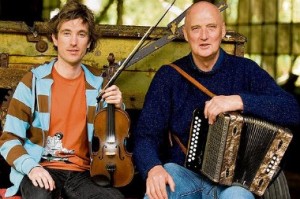There is a ruggedness and a wildness to the West of Ireland. To Breanndán Begley, one of he most accomplished two-row button accordion artists in the world, it’s only natural that the music of the region should match its terrain.
West Kerry, where Begley makes his home, is also part of Ireland’s Gaeltacht—an Irish-speaking region. So if West Kerry music seems to have a slightly different flavor from, say, the music of the heartland, that ancient language wields its own influence, too, says Begley.
Begley appears with his playing partner Caoimhín Ó Raghallaigh (kwee-veen o-Rye-a-lah) in two Philly-area concerts this weekend, the first, at the Coatesville Traditional Irish Music Series Saturday night at 8, and the second Sunday night at 8 at the Philadelphia Irish Center. (Details on our calendar.) To Begley, his Gaeltacht roots are a point of pride, and he clearly exults in the sound of the popular West Kerry dance music.
We tracked him down last week as he and Ó Raghallaigh made their way along the tour route that would bring them to our front door.
Q. To a lot of people, Irish music is Irish music. For the uninitiated, what is Kerry music and how is it different?
A. First of all, musically Ireland is a very big place and Kerry just has a dialect of its own. Even within the dialects, there are variations as well. In Kerry (for example), there would be the West Kerry style, which would have its own little differences. (West Kerry music) is more for dancing, first and foremost—slides, polkas and reels, for example. The dancing would be a very important
thing. You (also) have a lot of variety in Kerry music. Airs are valued in a session.
West Kerry is a rugged place, and the music reflects that. The music in the middle of the country is very different. The ruggedness in the music is (expressed) in the ornamentation. It’s something you wouldn’t shy away from. It’s a part of the sound within the sound. It’s rugged and lively—it’s everything.
Q. Your family background is musical, as it so often is when we interview Irish traditional artists. Have you ever stopped to ponder the old “nature/nurture” argument, and which is it?
A. It’s a mixture of all those things. I feel very lucky to be able to play like I do. It’s what I do best. It’s good that the background is there but it’s not necessary to be a great player. Breeding is better than feeding, they say, but I think it’s pure luck, really.
Q. Who taught you, and how did it influence your style of play?
A. I learned Irish music the same way I learned the language. My father played and sang. it was all around the place. Kids today have the computer; we had the accordion.
I never had any formal training. I don’t read music. It’s all by ear. It’s an oral tradition; it comes from the people. You didn’t even know you were playing music. All the musicians I knew in Kerry, none of them read music.
Q. You sing as well as play. Did one evolve later than the other, or did they come about more or less concurrently?
A. We did it (sang) all the time, more or less. I find the bridge between a Gaelic speaker and a musician is bridged by the singing. When you sing you’re doing both. In my youth there was hardly any radio. The only music you heard was live. The singing was live.
I didn’t really start singing on stage until the band Beginish (one of the notable ensembles to which he has belonged; another is Boys of the Lough) was formed. We didn’t have a singer so I started singing. I really love it. I love the songs.
The older I get, the more important I think the language is. The Irish language goes back farther than anything we have. It’s a living art form. It predates any of our poetry, and I’m sure a form of Gaelic was spoken by the Newgrange people. (In singing) I’m speaking my first language. In West Kerry youre never asked to “sing” a sing. You’re asked to “say” a song.
Q. How does collaborating with other musicians, which you’ve certainly done a lot, influence your play? How does playing with Caoimhín Ó Raghallaigh influence you?
A. In Boys of the Lough, I didn’t try to put my own stamp on it., (although) when it came to a solo, I’d do it exactly the way I wanted to do it myself. With Beginish, in one way it was easier because it was all Irish musicans. It was a kind of a melting pot playing with them.
I can safely sayer that I find so much freedom playing with Caoimhín. Music with him is definitely music of the moment. There’s a plan, but rarely do we ever do exactly like the plan. If you do anything else, you’re going by memory, or you’re doing an imitation of what sounded good last night. No two nights are the same, with Caoimhín and me together. It’s a great feeling playing with Caoimhín. Do I get bored? Never! Tired? Maybe.

